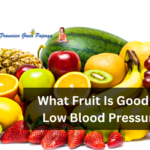When it comes to maintaining excellent health, low blood pressure is an important factor to consider.
Low blood pressure, or hypotension, is a condition that requires just as much attention as high blood pressure.
While medicine is an option, relying on nature’s bounty and including appropriate fruits into your diet might provide a more holistic approach to treating low blood pressure.
In this article, we’ll look at certain fruits that are especially good for people with low blood pressure.
These Fruits Are Good For Low Blood Pressure
Certain fruits are considered beneficial for those with low blood pressure because of their high potassium content and other elements that might help regulate blood pressure. Some of these fruits are:
Apricot
Apricots are high in potassium and vitamin A. It is one of the greatest potassium-containing foods with 2202 mg (63 percent DV) of potassium in a cup (119 g cubes) of dehydrated apricot. It has reduced salt, saturated fat, and cholesterol level.
Avocado
Avocado is abundant in monounsaturated fat and potassium, as well as a variety of vitamins. It contains avocadene, a unique fatty alcohol with medicinal properties for various illnesses including high blood pressure.
One cup (150 g cubes) contains 727 mg of potassium (21% of the daily recommended value) and only 10.5 mg of sodium (0% of the daily recommended value). Avocado is very low in cholesterol and high in nutritional fiber.
Avocado Reduces Blood Pressure
Banana
Eat a whole banana as a snack, add sliced banana to your morning cereal, or make a fruit salad using banana as one of the ingredients.
A medium-sized banana has 422 mg of potassium and 17 percent of the daily recommended dose for vitamin C, no matter how you eat it. With 2.83 g of dietary fiber, this fruit will keep you satisfied for longer.
Cantaloupe
Cantaloupe is a fruit of the melon family. It is high in both vitamin A and vitamin C. A cup of cubed cantaloupe (160 g) contains 494.5 mg of potassium, which is 14.1 percent of the daily required potassium value.
Remember to wash the cantaloupe before cutting it since bacteria might form on its surface. If you are not intending to eat it right away, place it in the refrigerator.
Citrus Fruits
Citrus fruits, such as oranges and lemons, are well-known for their high vitamin C content. Oranges and grapefruits are high in nutrients while being low in calories.
With 326 mg of potassium and no sodium, this is one of the greatest fruits for lowering blood pressure.
Limes are also high in potassium, calcium, phosphorus, vitamin A, and folate. They have 2.8 g of fiber in them.
Grapefruit
This citrus fruit has a distinct, acidic flavor. For the finest flavor and quality, choose ripe grapefruits.
Grapefruit and other citrus fruits contain bioflavonoids, which not only assist in lowering blood pressure but also cholesterol levels.
Half a grapefruit (123 g) contains 166 mg of potassium, which accounts for 5% of the daily required amount.
Melon
Melon is high in vitamin A, vitamin C, thiamin, and potassium. One cup of frozen melon balls (173 g) contains 484 mg of potassium or 14% of the daily recommended intake for potassium.
It is also high in magnesium, folate, and vitamin B6.
Prunes
Prunes are dried versions of European plums. They have a sweet flavor and a sticky, chewy texture. One cup (174 g) pitted prunes has 1274 mg of potassium and nearly no sodium.
Furthermore, prunes are high in dietary fiber. A quarter cup of prunes provides 12.1 percent of the daily fiber requirement.
Soluble fiber provides a feeling of contented fullness after a meal by slowing down the digestive process, which aids in weight loss.
If you have high blood pressure and are also overweight, prunes could be the fruit for you.
Why Are Fruits Beneficial To Blood Pressure Control?
Can fruits help lower blood pressure? Yes, due to the effects of the vital nutritional components found in them, such as:
Fiber
Because fiber lowers LDL cholesterol levels, inflammation, and blood pressure, it is crucial in the diet of persons suffering from hypertension and cardiovascular disease.
You can dramatically reduce your risk of stroke by eating high-fiber meals on a daily basis, as they assist in preventing circulatory problems.
This is the first reason why fruit is beneficial in decreasing blood pressure.
Magnesium
Magnesium in fruits enhances blood vessel flexibility and dissolves blood clots as they form, protecting the heart muscle and reducing arterial spasms.
Magnesium lowers blood pressure by preventing calcium from entering arteries and heart cells, lowering stress on the circulatory system.
Clinical studies show that sustaining the required magnesium intake for three months considerably decreases high blood pressure.
Calcium exists in conjunction with magnesium; they complement and support one another. Furthermore, calcium increases blood vessel enlargement.
Calcium
Calcium deficiency in the body can cause arterial wall constriction, which can be harmful to the blood.
However, if there is insufficient calcium in the blood, the body will compensate by taking calcium from the bones, resulting in osteoarthritis.
According to studies, the calcium in fruits does not increase the risk of heart disease as much as calcium supplements do, which is why fruits are helpful for decreasing blood pressure.
Potassium
Potassium helps to control blood pressure by minimizing blood vessel spasms. It interacts with one another to maintain the body’s water balance.
Furthermore, potassium increases the excretion of excess sodium through urine to lower blood pressure, which can assist in avoiding stroke. As a result, potassium is one of the reasons fruits have blood pressure-lowering qualities.
Including a variety of fruits in your diet can be a tasty and efficient way to manage your blood pressure. Nature provides a plethora of possibilities to assist your cardiovascular health, from potassium-rich bananas to nitric oxide-boosting citrus fruits and antioxidant-rich berries.
Remember that while these fruits might help you on your way to better blood pressure management, it’s also important to collaborate with your healthcare professional for a comprehensive approach to your health.
Thanks for reading. I hope you find it helpful.










